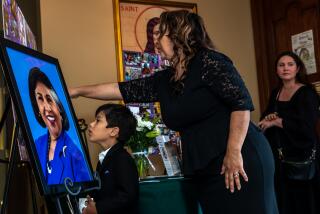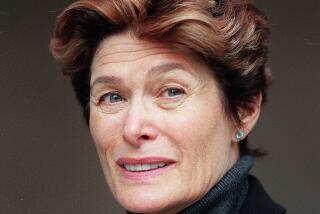Column: RBG died hoping to achieve one more thing, but what she gave us all was more than enough
- Share via
How are we to mourn the loss of Ruth Bader Ginsburg when there has never been another like her?
That tiny trailblazer with the quiet hair and the steady eyes, magnified behind glasses that seemed so unnecessary, really, because who could see things more clearly than she did?
RBG, a woman who lived her life outside of time and context: a lawyer when few women were; a fierce advocate of women’s rights in a smart, tailored suit; a passionate defender of social justice who left the theatrics and high rhetoric to others; a liberal with many conservative friends, including her late fellow Justice Antonin Scalia, who seemed in every way her polar opposite.
The world changed, politics roared, America’s mood shifted this way and that, and Ginsburg worked, steadily as she had always done, dismantling injustice wherever she could. Year after year, she painstakingly unraveled tangled patterns of the law to find where the truth was hidden, then stitched it up again so everyone could see what she saw.
As a lawyer with the ACLU in the 1970s, she laid the groundwork for current gender discrimination law. On the Supreme Court, whether in the majority or the minority, she was a master of the judicial mic drop, a poet of the dissenting opinion (for which she had a special black beaded collar).
“Throwing out preclearance when it has worked and is continuing to work to stop discriminatory changes,” she wrote of the court’s 2013 decision to undo key portions of the Voting Rights Act, “is like throwing away your umbrella in a rainstorm because you are not getting wet.”
And of the court’s 2000 decision to halt the presidential recount ordered by the Florida Supreme Court, she wrote: “The court’s conclusion that a constitutionally adequate recount is impractical is a prophecy the court’s own judgment will not allow to be tested. Such an untested prophecy should not decide the presidency of the United States.”
Disagree with her position, yes; deny its legitimacy, never.
RBG, with her love of opera and her lace collars, falling like a cavalier’s over her black robes. What’s wrong with a little style? Nothing, shouted fans half a century younger than her, drawn by her straight-talking defense of gay marriage, abortion rights, women’s rights and civil rights; they called her Notorious RBG and tattooed her face on their bodies.
Not the first woman Supreme Court Justice, but for three long years the only one, and certainly among the most famous and best loved of all who have sat on that high court. The proper Jewish grandmother, with a mastery of both nuance and precision and no patience for meanness, idiocy or party politics. A woman who smiled kindly and made you automatically check your posture, clear up your diction.
A role model at 60, a rock star at 80, she never seemed to change. Five-foot-nothing and 100 pounds dripping wet, she beat colon cancer, early-stage pancreatic cancer, lung cancer. In 2014, she received a coronary stent.
She did not think well of President Trump, who has already appointed two conservative Supreme Court Justices, one amid scandal and controversy. RBG made it clear she would do her level best to outlive his presidency, and many people, including me, prayed she would; without her presence on the court, the fate of so many of the civil rights she defended for so long seemed even more at risk. We held our breath with every hospital visit, waiting anxiously for her to send a message of reassurance.
And then we would sigh in relief. RBG. She seemed unbreakable, unflappable, possibly immortal.
But she wasn’t.
And more important, she didn’t have to be.
When she knew that even she could not beat the metastatic pancreatic cancer that would kill her, she dictated a statement to her granddaughter: “My most fervent wish is that I not be replaced until the new president is installed.” And indeed, as reports of her death broke, newscasters almost immediately turned to the question of what would happen next, while others wondered how much worse this terrible year could get.
I don’t blame those television anchors. When you work for a news organization, you learn to put shock and grief on hold, especially if you’re on television. Something terrible happens, someone important dies, and it’s news, which is your job. You don’t cry; you report. You go to work: Who’s doing what, where is it going, how much time do we have.
I have written often about the dead; I had to give myself several minutes to sob only three times: for Robin Williams, for Kobe and Gianna Bryant and now, for Ruth Bader Ginsburg.
This time I wept not just because of the loss but because I couldn’t bear the thought of this woman, this brilliant, formidable and kindhearted, once-in-a-century woman summoning what strength she had to make one more demand for justice.
As if she hadn’t done enough.
As if even she thought what mattered most about her death was what happens next.
Maybe in the long run. But not right now. Not in this moment. This country has lost a lot during 2020 — lives, jobs, confidence — but the loss of Ruth Bader Ginsburg transcends this year, and the years that follow. Her death will leave behind the tiniest robes in Supreme Court history, and one of the largest holes ever torn in that history’s fabric.
Few members of the United States government have ever been loved, admired and, yes, memed more than Ruth Bader Ginsburg. She was astonishing. So astonishing that her death, even at 87 and after multiple health issues, was honestly and universally shocking. As if a face had fallen off Mount Rushmore.
What happens next is not her responsibility, because, by God, if anyone could die content with what she had given the world — hope, change, insight, clarity, joy, love, hard damn work and killer style — it was Ruth Bader Ginsburg.
So RBG, if you can hear me: Don’t worry. Rest easy. We miss you like hell already, but we’ll take it from here. You have done more than enough.
For all of us.
More to Read
The biggest entertainment stories
Get our big stories about Hollywood, film, television, music, arts, culture and more right in your inbox as soon as they publish.
You may occasionally receive promotional content from the Los Angeles Times.











